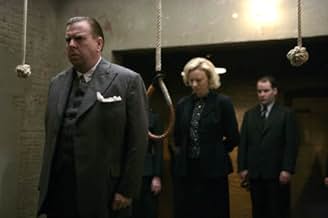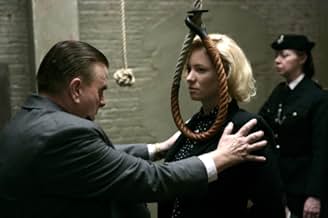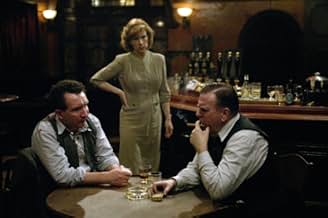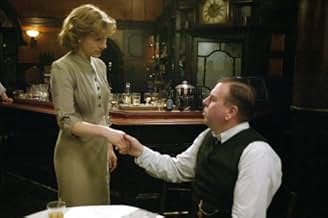IMDb-BEWERTUNG
7,4/10
5891
IHRE BEWERTUNG
Füge eine Handlung in deiner Sprache hinzuThe life and times of Albert Pierrepoint - Britain's most prolific hangman.The life and times of Albert Pierrepoint - Britain's most prolific hangman.The life and times of Albert Pierrepoint - Britain's most prolific hangman.
- Regie
- Drehbuch
- Hauptbesetzung
- Nominiert für 1 BAFTA Award
- 2 Gewinne & 4 Nominierungen insgesamt
Lizzie Hopley
- Dorothea Waddingham
- (as Elizabeth Hopley)
Empfohlene Bewertungen
I saw this DVD twice and read all the other user comments of this recent film before I considered I was ready to write my opinion on IMDb.com.
Capital punishment in the UK was abolished in 1965 and since then it has remained a controversial topic on which MPs have been given a free vote in the House (no whips office involved) and it has consistently been voted down by MPs ever since.The arguments for capital punishment range from "an eye for an eye"; why must the State keep killers alive at the public expense; as an example to other malefactors; to provide revenge for the bereaved families of the murder victim.I suppose the most controversial case cited for reimposing the death penalty stemmed from the Moors Murderers case from 1966, Ian Brady and Myra Hindley who died in custody.Even though they could not judicially be hanged, no Home Secretary since then has considered it politic to release or commute their sentence because of the expected public and media fury.Of course today in Britain killers are routinely sentenced "to life imprisonment" which depending on the circumstances, does not necessarily mean the killer's whole life.
Against this argument is the Christian doctrine of forgiveness and whether the State is executing an innocent man e.g.Timothy Evans (hanged by Pierrepont) instead of John Reginald Halliday Christie for the murder of Evans' baby daughter.
Albert Pierrepoint was certainly not "The Last Hangman" in the UK as I believe he resigned shortly after executing Ruth Ellis in 1955 after a continuous career as Chief hangman stretching from 1933 and as I said above. killers were hanged in the UK right up to 1964.In his 1974 auto- biography he turned against capital punishment with distaste as he considered it was merely the State exacting revenge and solved nothing.Considering he executed 608 murderers we must respect his opinions.I suspect those that advocate execution would not like to do the act personally as long as there is someone else to do it and bear the crushing guilt on their conscience.
Juliet Stevenson gives a marvellously understated performance as Anne Pierrepoint, Albert's wife and provides the home life and comfort to her husband.She is also the business brains in the marriage.We see the chilling, technical efficiency and speed which convinced the Allied powers in 1946 that a British hangman was the best for dispatching the many Nazi war criminals sentenced to death at Nuremburg.Albert was informed by the brigadier that the first batch to be hanged in a day was 13 with many more to come.Albert did not want to know what evil the condemned had done and tried to ensure he kept himself personally and professionally detached when performing his duties for the State.He even had a sense of compassion for the condemned by trying to complete the hanging in less time than his father's average of 13 seconds to reduce the fear and suffering in them.In one notable case he was done in 7 1/2 seconds.Likewise at Nuremburg he decided to hang the condemned female Belsen guards first with the youngest going first as she would be the most frightened.
To my knowledge this is the first film which accurately shows the technical method of hanging that was used in British prisons.It was ignorance by film producers of this that made their films unconvincing when showing a hanging scene as hangmen were advised to keep their methods entirely secret from the public.
All credit must go to Timothy Spall in the central pivotal role and the whole production team in evoking capital punishment in a Britain between 1932- 1955.
Capital punishment in the UK was abolished in 1965 and since then it has remained a controversial topic on which MPs have been given a free vote in the House (no whips office involved) and it has consistently been voted down by MPs ever since.The arguments for capital punishment range from "an eye for an eye"; why must the State keep killers alive at the public expense; as an example to other malefactors; to provide revenge for the bereaved families of the murder victim.I suppose the most controversial case cited for reimposing the death penalty stemmed from the Moors Murderers case from 1966, Ian Brady and Myra Hindley who died in custody.Even though they could not judicially be hanged, no Home Secretary since then has considered it politic to release or commute their sentence because of the expected public and media fury.Of course today in Britain killers are routinely sentenced "to life imprisonment" which depending on the circumstances, does not necessarily mean the killer's whole life.
Against this argument is the Christian doctrine of forgiveness and whether the State is executing an innocent man e.g.Timothy Evans (hanged by Pierrepont) instead of John Reginald Halliday Christie for the murder of Evans' baby daughter.
Albert Pierrepoint was certainly not "The Last Hangman" in the UK as I believe he resigned shortly after executing Ruth Ellis in 1955 after a continuous career as Chief hangman stretching from 1933 and as I said above. killers were hanged in the UK right up to 1964.In his 1974 auto- biography he turned against capital punishment with distaste as he considered it was merely the State exacting revenge and solved nothing.Considering he executed 608 murderers we must respect his opinions.I suspect those that advocate execution would not like to do the act personally as long as there is someone else to do it and bear the crushing guilt on their conscience.
Juliet Stevenson gives a marvellously understated performance as Anne Pierrepoint, Albert's wife and provides the home life and comfort to her husband.She is also the business brains in the marriage.We see the chilling, technical efficiency and speed which convinced the Allied powers in 1946 that a British hangman was the best for dispatching the many Nazi war criminals sentenced to death at Nuremburg.Albert was informed by the brigadier that the first batch to be hanged in a day was 13 with many more to come.Albert did not want to know what evil the condemned had done and tried to ensure he kept himself personally and professionally detached when performing his duties for the State.He even had a sense of compassion for the condemned by trying to complete the hanging in less time than his father's average of 13 seconds to reduce the fear and suffering in them.In one notable case he was done in 7 1/2 seconds.Likewise at Nuremburg he decided to hang the condemned female Belsen guards first with the youngest going first as she would be the most frightened.
To my knowledge this is the first film which accurately shows the technical method of hanging that was used in British prisons.It was ignorance by film producers of this that made their films unconvincing when showing a hanging scene as hangmen were advised to keep their methods entirely secret from the public.
All credit must go to Timothy Spall in the central pivotal role and the whole production team in evoking capital punishment in a Britain between 1932- 1955.
This film details the life and career of Albert Pierrepoint, the Lancashire hangman and owner of the pub 'Help the Poor Struggler' from the 1930s through to the 1960s. His profession is in the blood - following in his father's footsteps - but until the war he stayed anonymous, not even discussing matters with his wife.
Timothy Spall does well in the lead, although the historical accuracy is questionable in places. As a character study it works well, but ultimately it is a fairly depressing watch. The quotation at the end makes clear that Pierrepoint did become disillusioned with his quick and dispassionate job, moving from pride in the speed of his work to the feeling that something is inherently wrong with one person causing another's life to end with deliberate calculation.
Pierrepoint is a film which raises a lot of questions, but ultimately treats them in a superficial way. Historical cases well documented such as Evans and Ellis pass by without much note, which depersonalises them and makes their inclusion something of a lost opportunity.
Timothy Spall does well in the lead, although the historical accuracy is questionable in places. As a character study it works well, but ultimately it is a fairly depressing watch. The quotation at the end makes clear that Pierrepoint did become disillusioned with his quick and dispassionate job, moving from pride in the speed of his work to the feeling that something is inherently wrong with one person causing another's life to end with deliberate calculation.
Pierrepoint is a film which raises a lot of questions, but ultimately treats them in a superficial way. Historical cases well documented such as Evans and Ellis pass by without much note, which depersonalises them and makes their inclusion something of a lost opportunity.
When documenting a true story, criticism is often levied at the film-makers for condensing and twisting true-life events to suit their needs. That may well be the case. Unless the viewer has read first hand accounts of such true-life stories, then the film versions of these events appear stilted and fanciful.
Albert Pierrepoint's story has been well documented in not only his autobiography but by numerous historians and writers. With key events in the film being followed as closely as possible, it must have been nigh on impossible to keep everyone happy. Casting for this film must have been quite an exciting process. With people like Timothy Spall in the lead role, he showed all the care and attention that Pierrepoint was famous for. His wife, played by Juliet Stephenson, was a highly touching character. Although Mrs Pierrepoint never stood out in the original autobiography, Stephenson brings us a strong yet gentile woman, the driving force behind The Hangman. Eddie Marsan's portrayal as 'Tish' was casting at it's best.
A supporting cast of physically interesting character actors blended with superb lighting and set design, make a highly enjoyable and thought provoking film about the rights and wrongs of capital punishment.
The fact that the makers of 'The Last Hangman' managed to cram a fascinating life-long career into 90 minutes must serve as a tribute to their skill and craftsmanship.
Albert Pierrepoint's story has been well documented in not only his autobiography but by numerous historians and writers. With key events in the film being followed as closely as possible, it must have been nigh on impossible to keep everyone happy. Casting for this film must have been quite an exciting process. With people like Timothy Spall in the lead role, he showed all the care and attention that Pierrepoint was famous for. His wife, played by Juliet Stephenson, was a highly touching character. Although Mrs Pierrepoint never stood out in the original autobiography, Stephenson brings us a strong yet gentile woman, the driving force behind The Hangman. Eddie Marsan's portrayal as 'Tish' was casting at it's best.
A supporting cast of physically interesting character actors blended with superb lighting and set design, make a highly enjoyable and thought provoking film about the rights and wrongs of capital punishment.
The fact that the makers of 'The Last Hangman' managed to cram a fascinating life-long career into 90 minutes must serve as a tribute to their skill and craftsmanship.
Albert Pierrepoint was Britain's most prolific executioner, overseeing the hanging of more than 600 condemned men and women including Derek Bentley, Ruth Ellis and Lord Haw Haw. Adrian Shergold's film starring Timothy Spall in the title role is a dark period piece exploring the stark relationship between compassion and work ethic.
Pierrepoint approaches his grisly duties with pride, professionalism and a stoical detachment a third generation hangman, he is well accustomed to checking his personal life at the prison gate while he gets on with the job at hand.
But duty and morality are constantly battling in the back of his mind - a struggle neatly illustrated when he is seconded to Germany after the War and tasked with dispatching Nazi war criminals. His clinical work here is deliberately and uncomfortably linked to the crimes of the Nazis who gassed their Holocaust victims with the same brutal precision.
Back in England, as liberalism begins to take hold and high-profile executions enrage a population bubbling with discontent, Pierrepoint's reputation in the eyes of the public slides swiftly and irretrievably from British war hero to callous murderer a bewildering descent perfectly captured by Spall's mesmerising performance. Juliet Stevenson is not bad either as Pierrepoint's loyal wife gradually embittered by years of turning the other cheek at her husband's double life.
The film celebrates dignity and humanity but is laced with a uniquely British attitude evocative of Vera Drake and The Remains of the Day. Like these earlier social dramas, Pierrepoint culminates memorably in a momentary quivering of its previously resolute stiff upper lip.
Pierrepoint approaches his grisly duties with pride, professionalism and a stoical detachment a third generation hangman, he is well accustomed to checking his personal life at the prison gate while he gets on with the job at hand.
But duty and morality are constantly battling in the back of his mind - a struggle neatly illustrated when he is seconded to Germany after the War and tasked with dispatching Nazi war criminals. His clinical work here is deliberately and uncomfortably linked to the crimes of the Nazis who gassed their Holocaust victims with the same brutal precision.
Back in England, as liberalism begins to take hold and high-profile executions enrage a population bubbling with discontent, Pierrepoint's reputation in the eyes of the public slides swiftly and irretrievably from British war hero to callous murderer a bewildering descent perfectly captured by Spall's mesmerising performance. Juliet Stevenson is not bad either as Pierrepoint's loyal wife gradually embittered by years of turning the other cheek at her husband's double life.
The film celebrates dignity and humanity but is laced with a uniquely British attitude evocative of Vera Drake and The Remains of the Day. Like these earlier social dramas, Pierrepoint culminates memorably in a momentary quivering of its previously resolute stiff upper lip.
The movie tells the story of Albert Pierrepoint, Britain's most prolific hangman.
This may sound like the plot of a cheap exploitative movie but I can assure you this is a fantastic movie which respects the man, the profession, the people executed and deals with the conflicts this strange profession carries.
Thimothy Spall, a fantastic and very underrated actor, gives one of the best performances of his career.
I've seen this movie twice before and should definitely see it again.
Highly recommended
Wusstest du schon
- WissenswertesDespite the title Pierrepoint was not Britain's last hangman. He retired in the mid 1950s, shortly after executing Ruth Ellis. Britain never had a "last hangman", as the last two executions before suspension of capital punishment were carried out in different cities at the same time. The last two people executed were both guilty of the murder of John West, so it was decided to carry out the sentence at the same time in Aug 1964. People were still being sentenced to death In November 1965.
- PatzerThe Hamelin war criminal hangings took place in an execution chamber at the end of a cell corridor within the old prison itself, not in an aircraft hangar. Pierrepoint described this very clearly in his memoirs.
- Zitate
Albert Pierrepoint: I did a lot of jobs in Germany. More than were really good for me. Too many really. I get so bloody tired now...
- VerbindungenFeatured in Adolf Hitler: The Greatest Story Never Told (2013)
- SoundtracksMakin' Whoopee
Music by Walter Donaldson
Lyrics by Gus Kahn
Performed by Timothy Spall and Eddie Marsan
Top-Auswahl
Melde dich zum Bewerten an und greife auf die Watchlist für personalisierte Empfehlungen zu.
- How long is Pierrepoint: The Last Hangman?Powered by Alexa
Details
- Erscheinungsdatum
- Herkunftsländer
- Sprache
- Auch bekannt als
- Pierrepoint: The Last Hangman
- Drehorte
- Produktionsfirmen
- Weitere beteiligte Unternehmen bei IMDbPro anzeigen
Box Office
- Bruttoertrag in den USA und Kanada
- 23.192 $
- Eröffnungswochenende in den USA und in Kanada
- 2.028 $
- 3. Juni 2007
- Weltweiter Bruttoertrag
- 824.856 $
- Laufzeit
- 1 Std. 30 Min.(90 min)
- Farbe
- Sound-Mix
- Seitenverhältnis
- 1.85 : 1
Zu dieser Seite beitragen
Bearbeitung vorschlagen oder fehlenden Inhalt hinzufügen


































